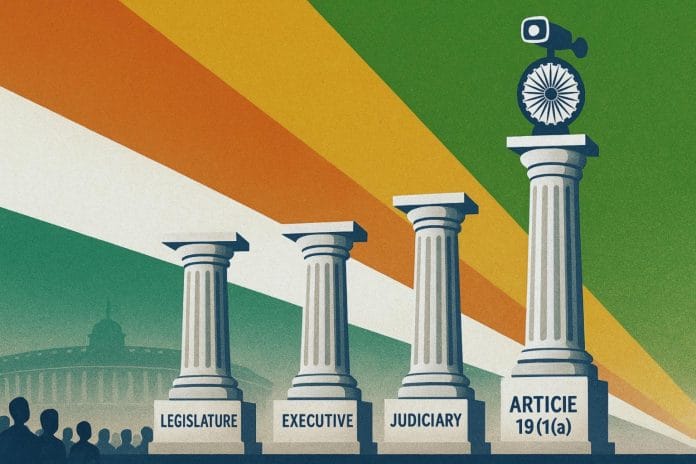Thank you dear subscribers, we are overwhelmed with your response.
Your Turn is a unique section from ThePrint featuring points of view from its subscribers. If you are a subscriber, have a point of view, please send it to us. If not, do subscribe here: https://theprint.in/
A free and fearless press is the cornerstone of a thriving democracy. Today, India faces a critical challenge: not a lack of formal press freedom, which the Constitution guarantees, but a media largely captive to partisanship and deference that silences scrutiny and stifles debate. At a time of upheaval at home and uncertainty abroad, India needs a press that holds power accountable, invites honest debate, and signals when it’s time to change course. Yet media conformity narrows perspective, weakens oversight, and blinds us to necessary course corrections.
Two recent episodes brought this home. After the tragic Pahalgam massacre and India’s military response under “Op Sindoor,” the tone at home was triumphant. Outside India, the reaction was quite different. Only a handful of countries openly supported our position as we struggled with our narrative. The global conversation focused more on how many jets India lost than on what the strikes achieved. Unverified media reports—claims of strikes on Karachi, Indian troops in Islamabad, and talk of a coup in Pakistan—circulated without confirmation. Such jingoism projects strength but costs credibility. Limited briefings and restricted foreign media access worsened the problem. Most concerning, mainstream outlets showed little interest in questioning the government about the security lapses that enabled the Pahalgam incident. Accountability was absent from the narrative.
A similar pattern is seen amid tariff disputes with the Trump administration. India’s government, like any sovereign state, must defend strategic and national interests. No sovereign country can engage in fair negotiations when faced with threats. Negotiations with the Trump administration demand resilience, realism, strategic finesse, and agility. Yet again, India’s mainstream media seems reluctant to press the government on its diplomatic effectiveness. We feature both local and international commentators who support India’s stance and criticize President Trump, yet we hesitate to scrutinize our own leaders on missed opportunities and challenges in navigating difficult negotiations. This is unfortunate, since there is more that unites the U.S. and India than divides us.
Patronage of official lines does not help India’s cause because half the story remains untold. Reducing complex issues to binaries risks oversimplification and misses meaningful reflection. Meanwhile, social media rumors and WhatsApp forwards churn out heat full of prejudice and little substance, leaving citizens with an incomplete picture. In both scenarios, media coverage amplified rather than examining the issues, leaving us with fewer answers and diminished credibility. Institutional freedoms exist in theory, but pluralism, critical inquiry, and independent questioning are lacking in mainstream coverage.
This is not a blanket indictment. India has courageous journalists and independent digital channels doing painstaking work, often at personal risk. But these voices are few and far between. Concentrated ownership and advertising dependence make critical investigative coverage costly. Outrage and spectacle get more attention than in-depth reporting. Threats—direct or indirect—of lawsuits, trolling, and intimidation discourage scrutiny.
As a member of the Indian diaspora living in the U.S. for over 25 years, I do not see Western media as a utopia. American journalism faces its own grave challenges: polarization, shrinking local and public news outlets, and ideological silos. Yet space remains for pluralism—competing outlets, leak-driven reporting, fact-checking, and sustained investigations. No single narrative prevails, and this competition keeps a pathway open for correction and reform. India needs these safeguards alongside its highways and data centers.
Within our own overseas community, a paradox emerges. Many in the diaspora expect and enjoy inclusion, due process, and a free press abroad, yet cheer for a narrow, chest-thumping media diet from home. Distance can harden identities and simplify complex realities; WhatsApp groups and partisan channels become echo chambers. This isn’t about judgment but about aspiring to the same standards we value here—pluralism, fact-checking, and accountability—and applying them to the India we love. Diaspora influence is real, and we should use it to widen the space for honest reporting, not to amplify rhetoric.
We often conflate patriotism with unconditional praise. Love of country means upholding principles and standards. A responsible press doesn’t diminish India; it resists complacency. It shows where a bridge is weak, where a school lacks teachers, where a hospital needs oxygen, where a scheme works—and where it doesn’t. That’s not hostility; it’s civic duty. Holding the government to account isn’t anti-national; it’s the pluralism that keeps democracy honest and alive.
In India today, this space feels smaller. Prime time “debates” are often theater without true scrutiny. Anchors rarely sustain tough follow-ups on results, data, and timelines. Public servants seldom allow for robust questioning during press conferences, further shrinking opportunities for accountability. When panels turn into cheerleading, even those with hard questions find the room closing in. When inquiry wanes, so does the public’s access to information.
Democracies thrive under honest reflection, not flattering mirrors. If we want a Viksit Bharat, we need media that helps us get there—by informing, not inflaming; verifying, not venerating; reflecting India as it is so we can build India as it should be.
Aman Kalra, MD, MBA
Boston, MA, USA
X: @anesthesiadoc71 | LinkedIn
These pieces are being published as they have been received – they have not been edited/fact-checked by ThePrint.


